Flipping a house can be a lucrative venture if done correctly. It involves purchasing, renovating, and selling a property for a profit. While the process may seem straightforward, successful house flipping requires careful planning, execution, and market knowledge. Here’s a step-by-step guide to help you navigate the process and flip a house successfully.
1. Research and Planning Before You Flip a House
Before diving into house flipping, thorough research and planning are crucial. Start by understanding the real estate market in your target area. Look for neighborhoods with rising property values, good schools, and amenities that attract buyers. Analyze recent sales to get a sense of what types of properties are in demand.
Next, create a detailed business plan outlining your budget, financing options, and projected timelines. Set clear goals for your project, including your target purchase price, renovation costs, and desired profit margin.
2. Securing Financing
Flipping a house requires a significant financial investment. Explore various financing options to determine the best fit for your situation. Traditional mortgages, hard money loans, and private investors are common sources of funding for house flippers. Each option has pros and cons, so consider interest rates, loan terms, and approval processes.
Ensure you have a solid financial plan to cover unexpected expenses during the renovation process.
3. Finding the Right Property to Flip a House
Finding the right property to flip is a critical step. Look for homes that are undervalued or need cosmetic repairs, as these often offer the best profit potential. Use real estate agents, online listings, and foreclosure auctions to find potential properties.
Conduct thorough inspections to identify major structural issues that could significantly impact your budget and timeline. It’s essential to clearly understand the property’s condition before making an offer.
4. Renovation and Remodeling
Once you’ve purchased a property, the renovation phase begins. Start with a detailed plan outlining the necessary repairs and upgrades. Prioritize projects that add the most value, such as kitchen and bathroom remodels, improving curb appeal, and updating flooring and fixtures.
Hire reputable contractors and obtain necessary permits to ensure all work meets local building codes. Stay organized and keep track of expenses to avoid going over budget. Regularly communicate with your contractors to ensure the project stays on schedule.
5. Marketing and Selling
With the renovations complete, it’s time to market and sell the property. Work with a real estate agent experienced in your target market to set a competitive price. Stage the home to highlight its best features and attract potential buyers. Professional photography and virtual tours can enhance your online listings and draw more interest.
Host open houses and private showings to showcase the property to prospective buyers. Be prepared to negotiate offers and work with your agent to finalize the sale.
6. Closing the Deal
Closing the deal involves several important steps. Ensure all necessary paperwork is in order, including inspections, appraisals, and title searches. Work closely with your real estate agent and attorney to review the contract and address any contingencies.
Once everything is in place, finalize the sale and transfer ownership to the new buyer. Collect your profit and assess the overall success of the project. Reflect on what worked well and identify areas for improvement for future house-flipping ventures.
Flipping a house can be a rewarding and profitable endeavor when approached with careful planning and execution. Each flip is a learning experience that can help you refine your strategies and improve your results in future projects.
FAQs on How to Flip a House
How can I estimate the costs of renovations?
Start by getting quotes from contractors for the work needed. Consider all aspects of the renovation, including materials, labor, permits, and unexpected expenses. Always add a contingency fund (typically 10-20% of the budget) for unforeseen issues.
What are the biggest risks involved in house flipping?
The biggest risks include underestimating renovation costs, overestimating the property’s resale value, market fluctuations, and unforeseen structural issues. Proper planning, thorough inspections, and a solid financial cushion can help mitigate these risks.
What are the tax implications of flipping houses?
Profits from house flipping are typically considered short-term capital gains and are taxed as ordinary income. Consult with a tax professional to understand your tax obligations and explore potential deductions related to renovation expenses.
How can I increase the resale value of the property?
Focus on renovations that add the most value, such as kitchen and bathroom remodels, improving curb appeal, and upgrading flooring and fixtures. Energy-efficient improvements and smart home features can also attract buyers and increase the property’s value.
Jones & Cooper Home Inspections provides inspections to homebuyers and sellers in the Metro Louisville area. Contact us to schedule our services.

